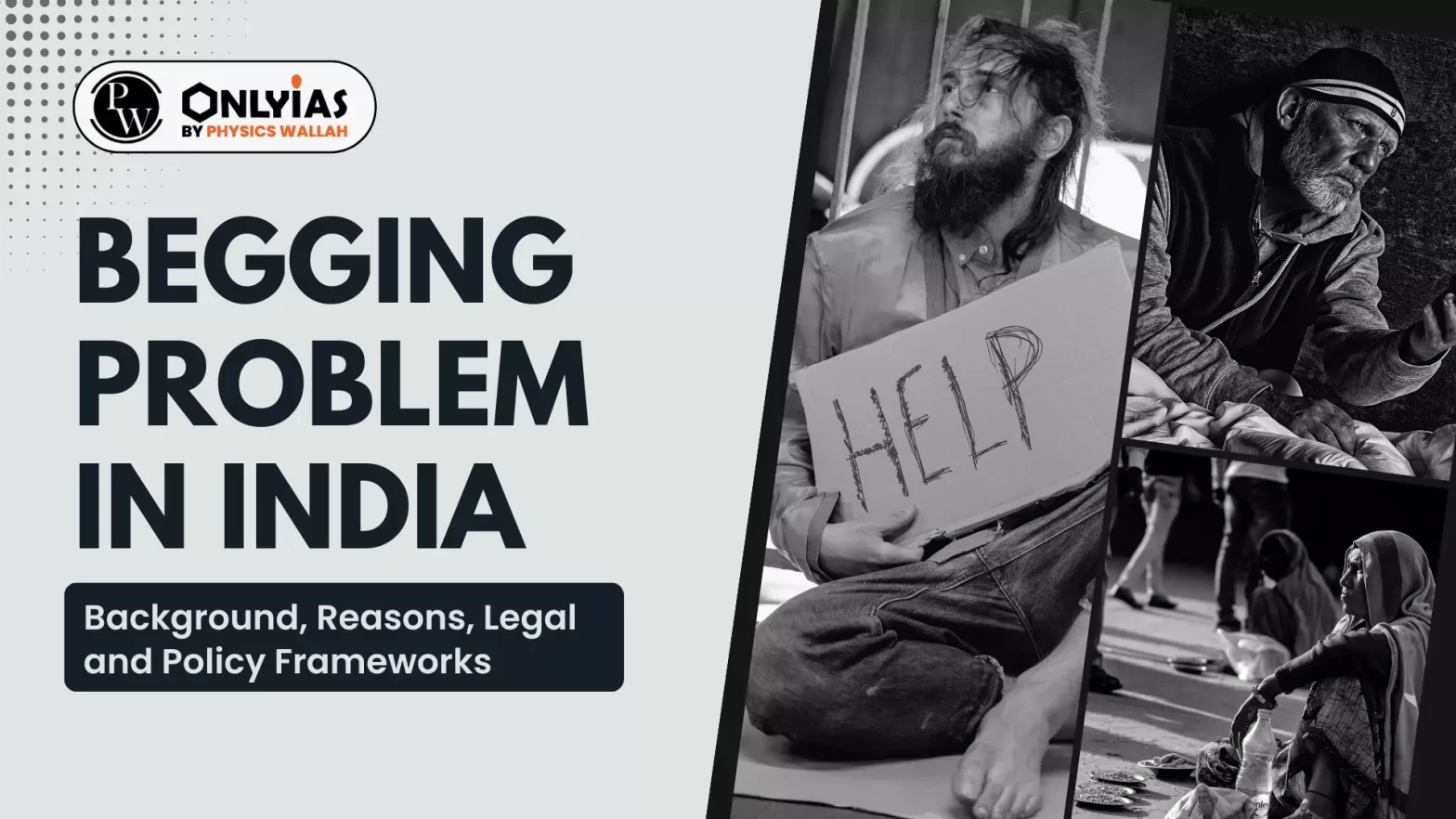Context:
This editorial is based on the news “Child begging: HC asks Delhi govt to provide “steps” taken to “rehabilitate” minors” which was published in the Indian Express. Begging is one of the most serious social issues in India in spite of its rapid economic growth.
What Is begging?
- Begging, also referred to as panhandling, is the practice of soliciting alms or other forms of help from others with little or no expectation of reciprocation.
- Background: Begging has always been seen as a noble deed. The term “bhiksha” (alms) is used often in Hinduism, Jainism, and Buddhism. “Zakat” is a fundamental principle of the Islamic religion. However, in recent times it has become a problem with several socio economic consequences.
Reasons For Begging in India
Here are the key reasons why begging is prevalent in India;
-
- Economic considerations often lead to individuals begging. Poverty, unemployment, underemployment, as well as income loss are all significant causes.
- It is often viewed as easy money by some beggars.
- Rapid urbanisation and migration also contribute to begging menace.
- People from rural areas may migrate to cities in search of better opportunities, but if those opportunities are scarce, they may end up begging.
-
- Famines, earthquakes, droughts, tornadoes, or floods may inflict major damage to property or farmland, forcing people to flee their homes or resort to begging to alleviate hunger pains.
-
- Beggary may sometimes be caused by a person’s poor psychology. Those reasons include frustration, reluctance to labour, and a proclivity toward solitude.
-
- Among the socioeconomic conditions that contribute to begging to include ancestral profession, family disintegration, and widowhood.
-
- There are no suitable provisions in India for the treatment or social rehabilitation of the blind, deaf, dumb, or physically disabled. In the lack of any other option, such people are forced to beg.
-
- Numerous religions in India recommend a life of poverty for their followers.
-
- Begging has become a significant industry in India especially in metropolitan cities of Delhi, Bangalore, Mumbai, Kolkata etc.
- The revenues of the day are distributed among the beggars, and each leader allocates his group to a certain zone.
-
Inadequate and insufficient reach of Social Welfare Programmes:
-
- For the homeless, unemployed, and mentally ill.
Legal and Policy frameworks in India to Deal With Begging
- As per Census 2011, there are 4,13,670 beggars and vagrants in the country.
- 9th entry of the State list in the Seventh Schedule – “Relief of the disabled and unemployable” has been described as the state subject.
- Article 41 of Directive Principles of State policy guides the state to carry out welfare measures in its own capacity.
- Article 23 of the constitution provides prohibition of human trafficking and forced labour.
- Section 363-A of the Indian Penal Code treats acts of kidnapping, or maiming individuals for the purpose of forcing them into acts of begging as an offence.
- Anti-begging acts (eg-Prevention of Begging Act, 1959) across states also seek to curb this practice, however, it has come under criticism by the Supreme Court of India due to cases of arbitrary nature of detention of these poor individuals by police which the court claims to be in violation of Article 14 and Article 21.
|
Implications Of Begging In India
- Discrimination and Social Exclusion: Those who beg may face discrimination and social exclusion, particularly if they have an evident physical or mental handicap. They may not have access to basic medical care or other necessities, and they may be vulnerable to abuse and exploitation at the hands of organised begging gangs.
- Exploitation and Human Trafficking: especially children. They might be forced or coerced into begging by criminal networks.
- Difficult to differentiate people who are genuinely in need: It becomes difficult to distinguish between real and fake beggars.
- Even the youngest children have been instructed in the proper method of begging.
- Typically, infants are found when sleeping. Babies are often poisoned during the day so that they seem unwell and may be easily transported by young women beggars
- There is widespread use of rented babies to legitimise begging.
Conclusion
Addressing beggary requires a multifaceted approach encompassing social, economic, and governmental initiatives. Through collaborative efforts, including rehabilitation programs and community engagement this problem can be tackled better.
Also Read: Income Inequality In India
| Prelims PYQ (2020):
Which one of the following categories of Fundamental Rights incorporate protection against untouchability as a form of discrimination?
(a) Right against Exploitation
(b) Right to Freedom
(c) Right to Constitutional Remedies
(d) Right to Equality
Ans: (d) |

